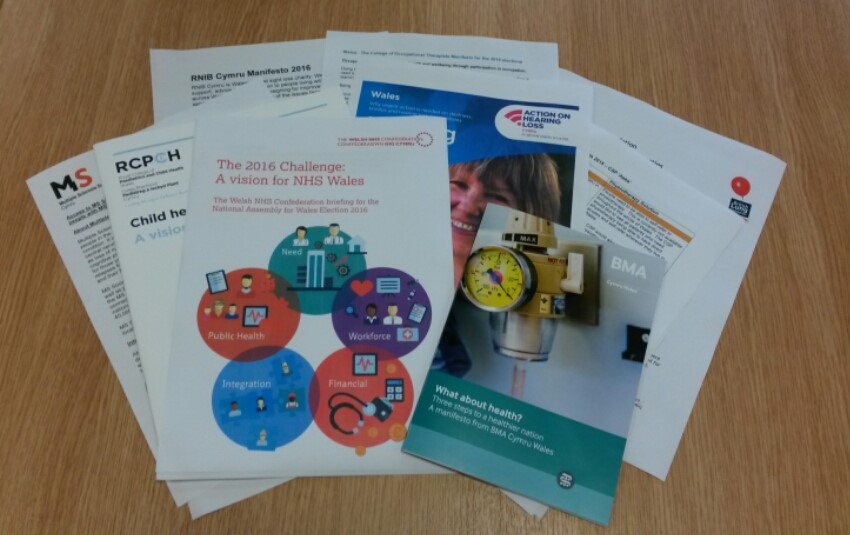Article by Amy Clifton, National Assembly for Wales Research Service
NHS workforce, Health Impact Assessments, performance targets, and access to health professionals In the run up to the 2016 Assembly elections, stakeholders are producing manifestos and briefings, aiming to influence political party manifestos in Wales.  This is the first in a series of blog posts highlighting the key health and social care issues identified by stakeholders as priority actions for the next Welsh Government to undertake in the fifth Assembly term. The Welsh NHS Confederation’s manifesto calls include:
This is the first in a series of blog posts highlighting the key health and social care issues identified by stakeholders as priority actions for the next Welsh Government to undertake in the fifth Assembly term. The Welsh NHS Confederation’s manifesto calls include:
- Commit to transformational change within the health service by putting in place a transition fund to enable investment in service change (to facilitate the shifting of services closer to home)
- Develop and implement a long-term vision for the health and social care workforce
- Support the overhaul of NHS performance targets, focusing more on outcomes rather than processes
- Commit to driving forward effective integration of health and social care through a joint outcomes framework and aligned indicators. This should include a commitment to co-terminosity between health board and local government boundaries
- Implement a ‘health in all policies’ approach, with public bodies being required to conduct health impact assessments on future policies
The Royal College of Paediatrics and Child Health (RCPCH)’s manifesto similarly calls for local authority planning decisions to include a public health impact assessment to consider the public health impact of planning decisions, e.g. on physical activity and obesity. BMA Cymru Wales also calls for Health Impact Assessments (HIAs) to be placed on a mandatory legal footing in its manifesto: What about health (PDF, 1.62MB). Some of the BMA’s other calls include:
- Ensure the quality of patient care is assessed with a clinical focus, by removing arbitrary targets and replacing them with a clinical needs based model.
- Take action to address the urgent workforce recruitment and retention challenge.
The RCN Wales similarly focuses on workforce, and calls on the next Welsh Government to ‘ensure safe nurse staffing levels’ in its Time to Care campaign. The Royal Pharmaceutical Society’s manifesto calls include:
- Establish a pharmacy-led Welsh Chronic Medication Service
- Permit pharmacist access to individual health records
- Fully integrate pharmacist expertise into NHS Multidisciplinary Teams
The RCPCH’s manifesto also calls for the next Welsh Government to use future tax powers to introduce levies on food and drinks high in fat, sugar and salt to tackle obesity in Wales. RNIB Cymru calls for new intelligent targets for ophthalmology treatment. It states that at present, the ophthalmology referral to treatment target (RTT) only focuses on the initial diagnosis and first treatment. It argues that as most sight loss conditions are degenerative but treatable, a clinically led target is needed with follow up treatments built in. RNIB Cymru wants to see sustainable funding for adequate provision of Eye Clinic Liaison Officer Services in all Local Health Boards. According to the charity, these services can save health and social care budgets £10.57 per user, by reducing the need for further interventions. [Contact RNIB for further information on its manifesto] Action on Hearing Loss Cymru’s manifesto Hearing Matters includes a call to tackle the growing prevalence and impact of hearing loss and make this a national priority in Wales. It wants Local Health Boards to ensure that everyone who could benefit from hearing aids continues to receive them free of charge on the NHS. The British Lung Foundation (BLF) Wales’ calls include:
- Invest in pulmonary rehabilitation – The BLF says only 1 in 10 people with Chronic Obstructive Pulmonary Disease (COPD) have access to a pulmonary rehabilitation course, It wants to see more respiratory physiotherapists employed to deliver these courses alongside allied professionals.
- Invest in patient education – The BLF would like the COPD patient education programme to be rolled out across Wales and believes other chronic conditions would also benefit from bespoke courses. It argues that better informed patients manage their conditions more successfully and save the NHS money, as for example ninety per cent of people living with a lung condition have a poor inhaler technique, and are therefore not taking their medication effectively.
[Contact the BLF Wales for more information] The Chartered Society of Physiotherapy (CSP)’s manifesto calls for access to self-referral to physiotherapy to be made available to all who need it across Wales (as this is currently not the case in some areas). It wants waiting times for physiotherapy assessment in Wales to be eradicated. The CSP highlights specific conditions where action is required; for example it calls for the development of a National Delivery Plan for Arthritis and Musculoskeletal Conditions and a National Delivery Plan for Chronic Non-Malignant Pain. The CSP also wants to see a huge increase in access to primary care-based physiotherapy. The College for Occupational Therapists (COT) is calling for access to occupational therapy for every A&E department and every primary care team in Wales. [Contact the COT for further information] Multiple Sclerosis (MS) Society Cymru states that people with MS in Wales are not consistently able to access the right Health Professionals in a timely manner. It wants to see every person with MS offered a care review at least annually, and the development of a network of MS care to provide a fairer and more efficient service. [Contact MS Society Cymru for more information] Our next blog post in this series will look at manifesto calls around mental health, carers, dementia, and cancer.






